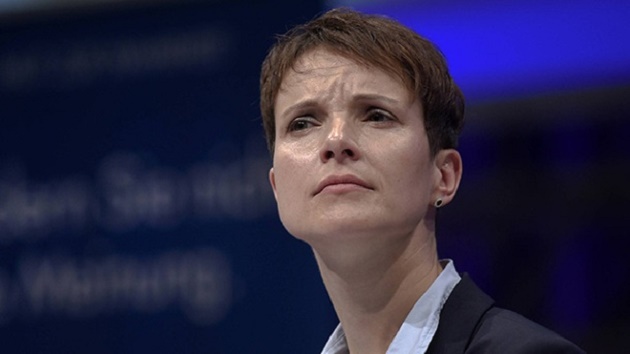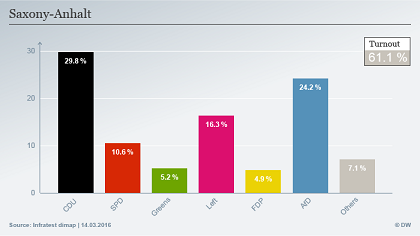Polarisation over refugees helps AfD populists to enter regional parliaments
The anti-immigration platform beats Social Democrats (SPD) in two of the three Länder. Angela Merkel faces internal debates after defending open politics for refugees.
Deutsche Welle, Agencies · DRESDEN · 14 MARCH 2016 · 12:55 CET

The three regional elections of Sunday 13 March showed the strength of emerging party AfD.
The “Alternative for Germany” is widely seen as a right-wing populistic anti-immigration party.
Their success in the states (Länder) of Baden-Württemberg, Rhineland-Palatinate and Saxony-Anhalt is a punishment vote from citizens who fear the arrival of thousands of asylum seekers could destabilise their regions.
The new party (born in 2013) managed to enter the parliaments of the three states.
THE RESULTS
In Saxony-Anhalt, they came second with an historic 24.2% of the votes, only behind Angela Merkel’s CDU (29,8%). The Left (16,3%) came third, and the Social Democrats only achieved a 10,6% of the vote.
In Baden-Württemberg, the Greens won the election with 30.3%, beating the ruling CDU. Here the AdF also came third, with 15.1% of the votes. Again the SPD came fourth (12.7%).
In Rheinland-Palatinate the SPD won (36.2%), followed by the CDU (31.8%) and the AfD (12.6%).

Analysts believe these are bad results for Angela Merkel. Internal debates could grow in her party after these regional elections. The Prime Minister has received much criticism for her policies in the refugee crisis among her own lines.
MERKEL: CHRISTIAN PRINCIPLES TO TACKLE THE REFUGEE CRISIS
Merkel has said her Christian values influence her political decisions.
In September 2015, when asked about the risk of an Islamisation of Germany, she said: “Fear was never a good advisor. Cultures that are marked by fear will not conquer their future.”
Instead of blaming refugees, Merkel encouraged Germans to learn more about their own Christian roots and live out their biblical faith.
“I would like to see more people who have the courage to say ‘I am a Christian believer’. And more people who have the courage to enter into a dialogue”, she said.
Published in: Evangelical Focus - cities - Polarisation over refugees helps AfD populists to enter regional parliaments
